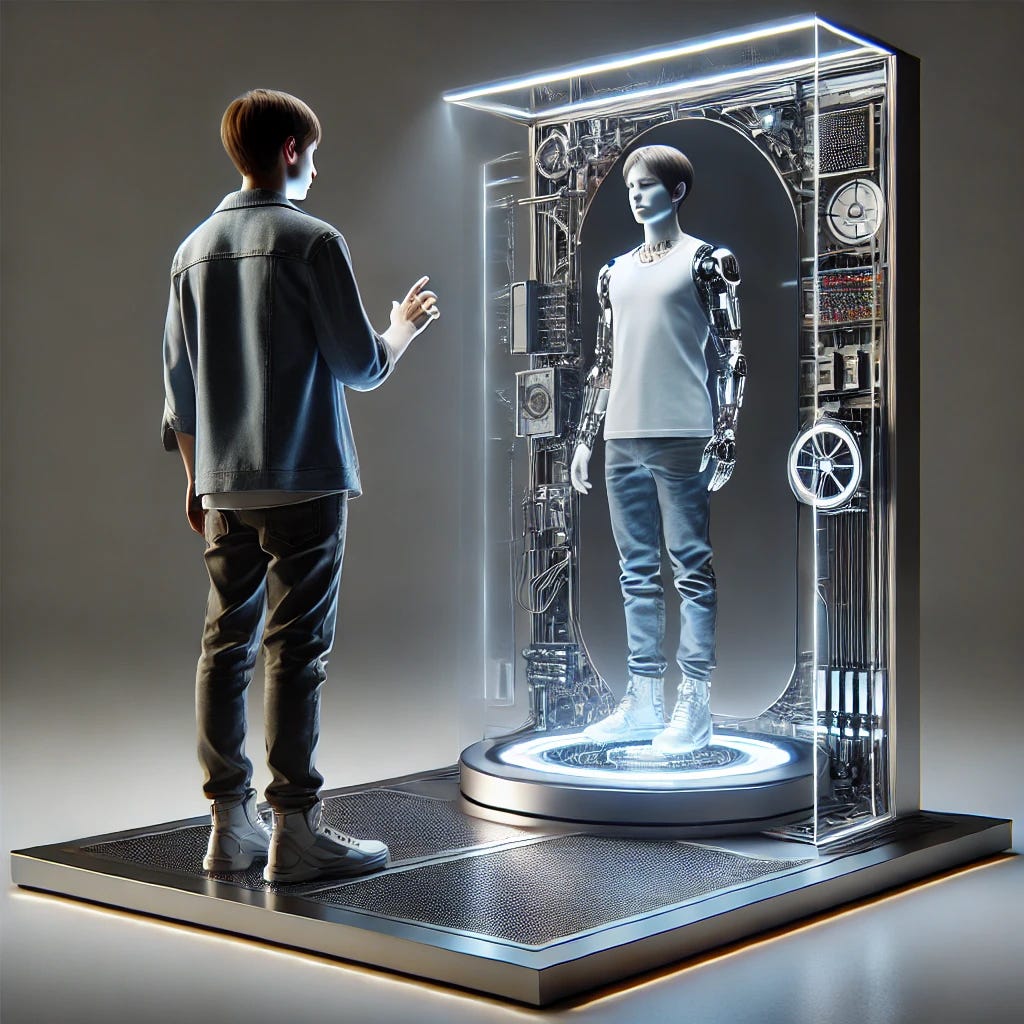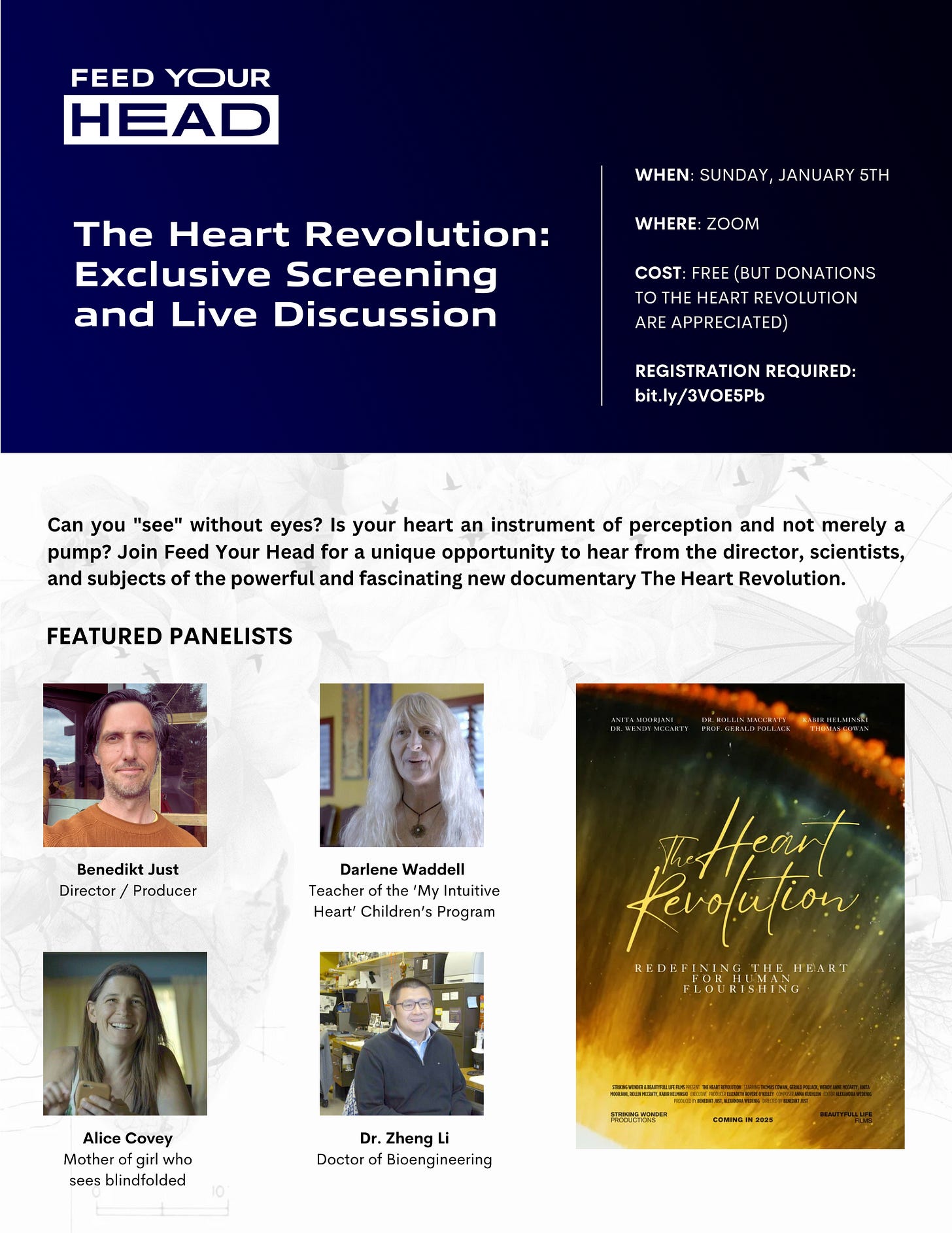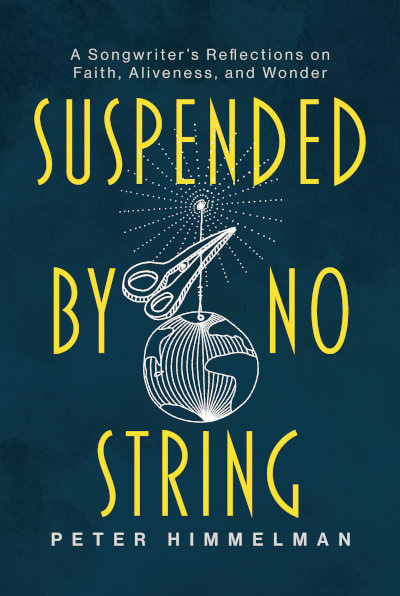The Machine as a Mirror
How AI Can Help Us Become More Human.
Register here for an exclusive screening and online Q&A.
It’s easy to be afraid of the machines. The rapid growth of artificial intelligence—a technology that learns, adapts, and mimics—is unsettling. Many of my friends, bright and thoughtful people, find it terrifying. “They’ll take away our jobs,” they say. “They’ll think like us, write like us, they’ll be faster and better at everything.” And when I ask them what a human can do that AI can never do, they pause, furrow their brows, and say something like, “Well… AI can never feel or act like a real human being.”
To that, I’ll often respond with a quieter, more difficult question: how often do we do that?
How often do we act like true human beings? How often do we say, feel, or think something that isn’t just an amalgamation of what others are saying, feeling, or thinking? How often do we speak with a clarity and depth that is uniquely our own? The rise of AI, I’d argue, isn’t only a technological milestone—it’s a mirror.
What It Means to Be Human
Recently, I was having a conversation with my friend Judea Pearl, a pioneer in AI research, about what this technology is striving to achieve. He mentioned that a new frontier for AI—if it’s to truly replicate humans—would be understanding concepts like belief in God. Not that machines could believe in God, but they would need to understand how humans think about such vast and ineffable ideas.
Think about that for a moment. We’re at a point where a machine might be programmed to understand questions of meaning, purpose, and faith—questions that, for centuries, have defined what it means to be human.
But here’s the irony: the closer AI comes to replicating us, the more it pushes us to grapple with who we really are.
The Machine as a Mirror
When we see AI producing music, poetry, art, or philosophical musings, we feel unsettled because it intrudes on an arena we thought belonged only to us. Yes, AI can write a love poem or describe the beauty of a sunset, and our first instinct is to dismiss it: “That’s not real. The machine doesn’t really feel anything.”
And yet again, AI’s existence challenges us to ask: do we?
How often do we slow down to actually feel what we’re writing or saying? How often do we live authentically, creating rather than imitating, thinking rather than regurgitating? The machine doesn’t feel—this is true—but it forces us to consider whether we are merely functioning, merely processing, as it does.
We talk a lot these days about the dangers of AI, but I see its potential to act as a tool for rediscovery. It can help us ask better questions. It can force us to dig deeper, to find what machines cannot replicate: our irreducible humanity — which includes desire, curiosity, love, forbearance, empathy, and imagination — along with things we might wish to see eliminated: jealousy, hatred, anger, and violence.
Originality in an Imitative World
Here’s the paradox of being human in the age of AI: for all its speed and data-crunching power, AI is inherently derivative. It learns from us. It predicts based on patterns we’ve already laid down. The words, the ideas, the outputs—it’s all recombination. A sophisticated mirror reflecting the world we’ve created.
And that’s where we, as humans, have an edge—if we’re willing to embrace it. We are not just products of our past or our influences. We have the ability to transcend them. Unlike AI, we can leap toward originality. We can think and create in ways that break patterns rather than reinforce them. But we have to choose to do so.
When I say AI can help us become more human, what I mean is this: it makes imitation obvious. It lays bare the superficial, the redundant, and the derivative. If our work, our words, or our feelings feel automated, that’s not AI’s fault—it’s a wake-up call. AI forces us to rise above what’s merely good enough. It demands that we be human enough not to outpace the machines—they’re too fast and only getting faster — but to immerse ourselves more deeply in our messy, non-linear, bravely curious, inexplicably beautiful, and wildly imaginative leaps of fancy.
Reclaiming Our Humanity
So how do we do it? How do we ensure that we act, think, and feel like humans in an age of algorithms?
1. Slow Down AI works at light speed. We don’t have to. Slowing down—whether in our conversations, writing, or thoughts—allows us to access the layers of depth that machines can’t reach. The nuance, hesitation, and imperfect perfection of humanity lie in the slowness and care we take in our conversations, work, and relationships.
2. Feel Something, Anything AI mimics language but doesn’t feel joy or heartbreak. If a machine can write something indistinguishable from us, perhaps it’s time to bring more feeling to our words. Speak as though you have something to lose. Write as though you might never get another chance to be understood.
3. Be Unpredictable Patterns are AI’s lifeblood. To transcend it, we need to do what machines can’t: surprise ourselves. Take risks in your work. Ask questions you don’t know the answers to. Say things that might make you vulnerable.
4. Seek Meaning Machines will never wrestle with purpose the way humans do. What drives us, what we believe in, the ache of longing, or the pull of a greater “why” are things AI can mimic but never truly possess. Let those questions animate your life.
The Invitation
AI is not the end of humanity—it’s an invitation to reclaim it. The rise of machines will force us to be more thoughtful, more original, and more alive. It will challenge us to strip away the pretense of thought and feeling and replace it with the real thing.
To my fearful friends—and to you, dear reader—AI can remind us that being human is a choice. It’s a choice to engage deeply with our world, feel profoundly, and create fearlessly. The machines will keep improving, but so can we. The difference is that we can improve in ways that matter most—not through speed or efficiency but through the kind of chaotic, imperfect splendor that makes us truly alive.
Check out Peter’s new book Suspended by No String: A Songwriter’s Reflections on Faith, Aliveness, and Wonder.








My favorite passage from Soloveitchik's "Man Of Faith In The Modern World" suggests that ultimately Man need not be driven by the past. We are not machines:
>> CHAPTER VII: DESTINY, NOT CAUSALITY, GOVERNS JEWISH HISTORY
The Patriarchic Covenant introduced a new concept into history. While universal (non-Jewish) history is governed by causality, by what preceded, covenantal (Jewish) history is shaped by destiny, by a goal set in the future.
Universal history is of an etiological nature; every event is brought about by a preceding cause. Event A occurs and B follows, or, colloquially speaking, A begets B. Such history develops almost mechanically, origins determine events; the present is precipitated by the past. Most historians are guided by this principle, namely, that causality (or high probability) dictates unfolding events. When secular scholars try to interpret Jewish history in this manner, they inevitably arrive at bizarre conclusions and distortions.
Covenantal Jewish history, by contrast, is teleological, not etiological. This means that it is propelled by a purpose. What happens to Jews emanates from a Divine promise foretold about the future, rather than by events impelling from the past. Jewish history is pulled, as by a magnet, towards a glorious destiny; it is not pushed by antecedent causes. This is the meaning of the Patriarchic Covenant; it is a goal projected, a purpose pursued, a destination to be reached. <<
Well, I love - and feel - everything you're saying. And agree with your wonderful suggestions. But no. You haven't talked me into being " for" AI. We can do everything you suggest, in my opinion, without it.